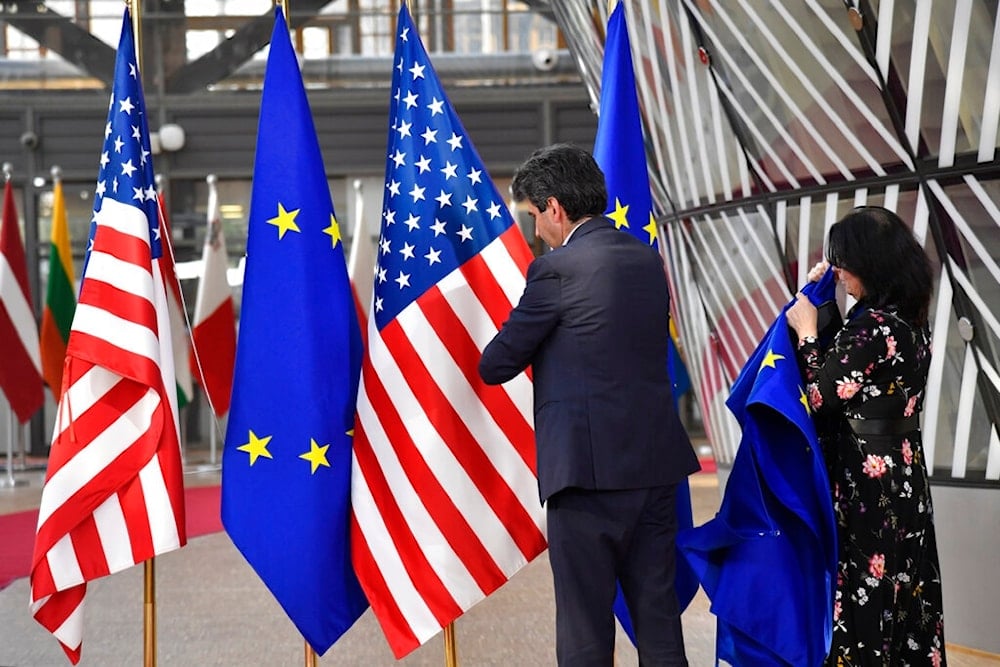EU warns no tariff breakthrough as US expands steel duties: Bloomberg
EU-US trade talks stalled as both sides clashed over expanding US steel tariffs, EU digital regulations, and the slow implementation of the July trade deal amid broader geopolitical tensions.
-

A member of protocol puts up the European Union and US flags for an EU summit in Brussels, Thursday, March 24, 2022. (AP)
The European Union has signaled that its meeting with senior US trade officials would not yield any tariff-cutting breakthrough on Monday, according to Bloomberg.
EU trade commissioner Maros Sefcovic said the gathering was intended as "a stock-taking exercise" rather than a negotiation, as ministers prepared to meet US Commerce Secretary Howard Lutnick and US Trade Representative Jamieson Greer for the first high-level discussion since the July trade accord.
That agreement introduced a 15% US tariff on a range of European goods, while the EU agreed to eliminate duties on several categories of US industrial, agricultural, and food products. Both sides also committed to further talks on other barriers, including the 50% tariff Washington applies to EU steel and aluminum, a measure Brussels has mirrored with its own 50% charge on volumes above a set quota.
Eroding deal
The context around those tariffs has grown more complicated in recent weeks. Washington has expanded its 50% steel and aluminum duties to cover more than 400 EU-linked products, prompting deep concern in Brussels that the July deal is being gradually eroded. The EU, meanwhile, has been urging the US to proceed with the tariff-reduction commitments embedded in the agreement, noting that several of the promised provisions, particularly on steel, remain unimplemented.
But the US has added its own conditions. Lutnick has argued publicly that progress on steel and aluminum depends on the EU softening parts of its digital rulebook, a demand that has widened the scope of the dispute far beyond trade. US officials have also expressed frustration at the EU’s slow legislative process, highlighting the fact that the European Parliament has yet to formally ratify the deal.
Transatlantic trade strains
Over lunch, Lutnick and Greer are expected to review the pact with EU ministers and hear concerns about Washington’s expanding tariff list, Bloomberg said. European officials say the additional duties undermine the spirit of the July accord and risk distorting entire industrial supply chains.
At the same time, US negotiators have raised their own grievances, arguing that Europe has been slow to fulfill its commitments, pointing to the European Parliament’s failure to formally ratify the pact. Washington is also pressing for changes well beyond trade, pushing the EU to weaken elements of its digital and environmental rules.
"The Americans have wishes concerning Europe that don’t have much to do with trade, such as the structure of our entire digital regulatory framework," said Danish Foreign Minister Lars Lokke Rasmussen. "I’m not sure today will be the day we see major breakthroughs."
Friction over Ukraine
The political atmosphere surrounding the talks has also shifted. Both sides are seeking closer alignment on China, particularly in response to Beijing’s restrictions on critical minerals essential for defense and advanced manufacturing. EU diplomats say the transatlantic agenda has become increasingly entangled with strategic concerns over supply chains and industrial security.
The discussions are further overshadowed by growing European irritation over Washington’s latest attempt to draft a framework to end the war in Ukraine without consulting its allies. That move has intensified the sense in Brussels that trade frictions are part of a wider pattern of US unilateralism.
Poland’s undersecretary of state, Michal Baranowski, warned that the US cannot pursue its strategy alone. "They are in fact dependent on European involvement and our contribution to economic prosperity and military support for Ukraine," he said.
Read more: Belgium braces for nationwide strikes over austerity reforms

 4 Min Read
4 Min Read








